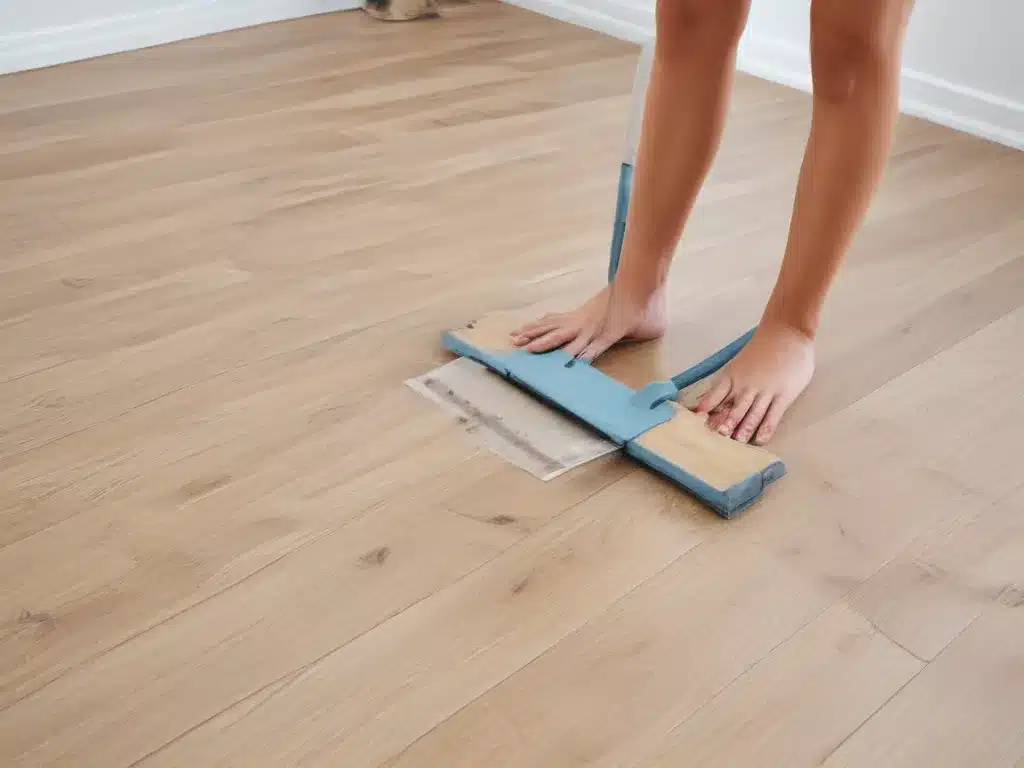Why Avoid Toxic Chemicals?
Toxic chemicals found in many conventional cleaning products can pose serious risks to human health and the environment. These chemicals, including ammonia, chlorine, and formaldehyde, can cause respiratory problems, skin irritation, and even cancer. Additionally, they contribute to indoor air pollution and can harm aquatic life when washed down the drain.
I have made a conscious decision to avoid these harmful substances in my cleaning routine. Not only do I want to protect my own well-being, but I also aim to minimize my impact on the planet. By using natural, non-toxic alternatives, I can maintain a clean home while safeguarding the health of my family and the environment.
Natural Floor Cleaning Solutions
Vinegar and Water
One of the most effective and budget-friendly options for cleaning hard floors is a vinegar and water solution. The acetic acid in vinegar is a natural disinfectant and deodorizer, making it an excellent choice for tackling grime, stains, and unpleasant odors.
To make this solution, I simply mix equal parts of white vinegar and warm water in a spray bottle. I find that this combination works wonders on a variety of hard floor surfaces, including tile, laminate, and hardwood.
Baking Soda and Essential Oils
Baking soda is another versatile and eco-friendly cleaning agent that can be used on hard floors. Its gentle abrasive properties make it ideal for scrubbing away stubborn grime and grease.
I like to create a paste by mixing baking soda with water and a few drops of my favorite essential oils, such as lemon or tea tree, which provide a fresh, natural scent and additional cleaning power. This paste can be applied to the floor, allowed to sit for a few minutes, and then scrubbed with a damp cloth or mop.
Castile Soap and Water
Castile soap, made from plant-based oils, is a gentle yet effective cleaning solution for hard floors. It cuts through grease and dirt without leaving behind harsh chemical residues.
To use castile soap for floor cleaning, I dilute a small amount (about 1/4 cup) in a bucket of warm water. This solution can be used with a mop or cloth to clean and shine hard floors of all types.
Floor Cleaning Techniques
Dry Sweeping
Before wet cleaning, it’s essential to remove any loose dirt or debris from the floor. I find that dry sweeping with a soft-bristled broom or dust mop is an effective way to achieve this. This step not only ensures a more thorough clean but also helps prevent scratches on the floor surface caused by abrasive particles.
Spot Cleaning
Sometimes, hard floors require a little extra attention in certain areas. For stubborn stains or heavily soiled spots, I rely on spot cleaning techniques. This may involve applying a concentrated cleaning solution directly to the affected area and allowing it to sit for a few minutes before scrubbing and rinsing.
Mopping
Once the floor has been swept and any problem areas have been addressed, it’s time for mopping. I prefer to use a flat mop with a reusable, washable pad or microfiber mop head. These types of mops are more effective at picking up dirt and grime compared to traditional string mops.
When mopping, I follow a systematic pattern, working from one end of the room to the other and overlapping my strokes to ensure complete coverage. I also make sure to rinse and wring out the mop frequently to avoid spreading dirty water around.
Maintaining Clean Hard Floors
While natural cleaning solutions and techniques are effective, maintaining clean hard floors also requires a bit of preventative maintenance. Here are a few tips I follow:
- Place door mats at all entryways to help trap dirt and debris before it gets tracked inside.
- Encourage family members and guests to remove shoes when entering the home to minimize the amount of dirt and grime being brought in.
- Sweep or vacuum high-traffic areas regularly to prevent the buildup of dirt and grit that can scratch floors over time.
- Address spills and stains promptly to prevent them from setting in and becoming more difficult to remove.
By incorporating these simple steps into my cleaning routine, I can keep my hard floors looking their best without relying on harsh, toxic chemicals.
Conclusion
Cleaning hard floors without toxic chemicals is not only possible but also beneficial for our health and the environment. By utilizing natural solutions like vinegar, baking soda, castile soap, and essential oils, combined with proper cleaning techniques, I have been able to maintain a spotless home while minimizing my exposure to harmful substances.
If you’re looking to transition to a more eco-friendly and health-conscious cleaning approach, I encourage you to give these methods a try. Not only will you be doing your part for the planet, but you’ll also be creating a safer and more comfortable living space for yourself and your loved ones.
For professional cleaning services that prioritize the use of non-toxic and environmentally friendly products, consider exploring the offerings of Adam Cleaning. Their experienced team can help you achieve a pristine home without compromising your well-being or the environment.







